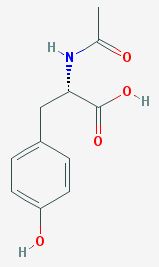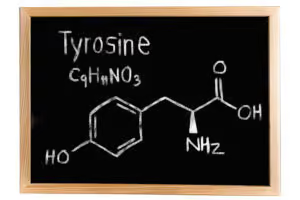Table of Contents
N-Acetyl L-Tyrosine (NALT or NAT) is a highly bio-available form of the amino acid L-Tyrosine. Your brain uses the enzyme tyrosine hydroxylase to convert L-Tyrosine into L-DOPA. Decarboxylation of L-DOPA results in synthesis of the neurotransmitter dopamine.[i]
Once converted into dopamine, the enzyme dopamine-beta-hydroxylase converts it into the neurotransmitters norepinephrine (noradrenaline) and epinephrine (adrenaline). This triad of neurotransmitters are collectively referred to as “catecholamines”.
N-Acetyl L-Tyrosine can be a highly effective nootropic for boosting cognitive function. And is particularly helpful in maintaining cognitive performance when you’re under practically any kind of stress. Including music played above 90 dB’s.
N-Acetyl L-Tyrosine works in synergy with stimulants like methylphenidate (i.e. Ritalin).[ii] Drugs like Ritalin work by blocking the reuptake of the neurotransmitters dopamine, and norepinephrine. And if there’s not enough dopamine available to do the job, Ritalin doesn’t work very well. NALT potentiates increases in extracellular dopamine.
NALT also stimulates the production of thyroid hormones T3 (triiodothyronine) and T4 (thyroxine) which are crucial in maintaining both overall physical and cognitive health.
NALT can boost libido, memory, focus, concentration, mood, offers anti-depressant effects, and improves executive function in those with ADHD.
N-Acetyl L-Tyrosine helps:
- Cognitive Stress. NALT produces the catecholamine-triad of neurotransmitters dopamine, norepinephrine and epinephrine. Sleep deprivation and extreme stressors like heat and cold can deplete catecholamine levels. NALT restores them to preserve optimal cognition.[iii]
- Neurotransmitters. NALT is a necessary precursor for dopamine, norepinephrine and epinephrine. As your dopamine levels increase, you’re better able to concentrate, organize your thoughts, and stay productive.
- Attention Deficit Disorder (ADHD). NALT can be an effective treatment for ADHD symptoms. NALT works in synergy with pharmaceutical drugs like Ritalin and Adderall by boosting extracellular levels of dopamine. Helping these drugs be more effective. And mitigating side effects like crashes when the drug wears off.
Overview
N-Acetyl L-Tyrosine (NALT) is a form of the amino acid L-Tyrosine. The addition of an acetyl group to L-Tyrosine makes it more bioavailable than supplementing with L-Tyrosine.

Your brain converts L-Tyrosine to L-DOPA which then produces the neurotransmitter dopamine. The unused dopamine is then further converted into the neurotransmitters norepinephrine (noradrenaline) and epinephrine (adrenaline). This triad of neurotransmitters are collectively referred to as “catecholamines”.
“Tyrosine” is derived from the Greek word tyros, meaning cheese. It was first discovered by German chemist Justus von Liebig in 1846 in the protein casein from cheese.
Tyrosine is considered a non-essential amino acid because it can be synthesized in your body from phenylalanine. Which is found in many high-protein foods such as poultry, fish, dairy, nuts, soy products, lima beans, avocados and bananas.
NALT enhances working memory and executive function in the prefrontal cortex. It helps with creative flow states, is fuel for inspiration, cognitive flexibility, and the kind of “convergent thinking” you do in multiple choice exams.
N-Acetyl L-Tyrosine assists in the production of thyroid hormones T3 (triiodothyronine) and T4 (thyroxine) which are crucial in maintaining both overall physical and cognitive health.
N-Acetyl L-Tyrosine (NALT) vs. L-Tyrosine: What’s the Difference?
 N-Acetyl L-Tyrosine (NALT) is the amino acid L-Tyrosine with an acetyl group added. When you take NALT as a supplement, it breaks down in your kidneys back into L-Tyrosine. So in theory, the two supplements offer the same benefits.
N-Acetyl L-Tyrosine (NALT) is the amino acid L-Tyrosine with an acetyl group added. When you take NALT as a supplement, it breaks down in your kidneys back into L-Tyrosine. So in theory, the two supplements offer the same benefits.
There is some debate in the nootropics community on which is more effective. NALT or plain L-Tyrosine. NALT is a more soluble form of L-Tyrosine so it should be more bioavailable to your body.
However, some studies report that in some cases, a sizeable percentage of supplemental NALT is excreted in urine before it’s converted into L-Tyrosine.[iv]
On a personal note, I haven’t had any issues using NALT as a source of L-Tyrosine. It gives me a dopamine and adrenal boost you’d expect from supplementing with a dopamine precursor.
When dealing with ADHD/ADD it’s particularly effective when stacked with ALCAR (Acetyl-L-Carnitine). ALCAR easily crosses the blood-brain barrier for boosting acetylcholine levels. And seems to positively influence serotonin levels. And NALT provides my brain with the dopamine it needs to mitigate symptoms of ADHD/ADD.
But in the interests of full transparency, this is stacked with 20 mg of Ritalin twice a day. Clearly, my brain doesn’t have the capacity to produce enough dopamine on its own. And needs the boost that comes from supplementing with NALT.
So like all nootropics, YMMV. Always take into account how each nootropic works synergistically with others in your stack. And how they work with any meds you need to take.
This is as much art as it is science. And experimentation is key for optimal cognition, and a ‘Limitless’ mindset.
How does N-Acetyl L-Tyrosine work in the Brain?
N-Acetyl L-Tyrosine boosts brain health and function in several ways. But two in particular stand out.
- N-Acetyl L-Tyrosine improves memory and cognition under acute stress. Acute stress is defined as short-term stressors that can affect cognition. Examples are extreme heat or cold. Things like cold showers, extreme sports, car accidents, relationship problems, intense movies, business deals gone awry, exams and war zones.
In one study done at the University of Bedfordshire in the UK, the effect of L-Tyrosine on cognitive performance was measured before an exercise task.
Researchers recruited 8 soccer players. And had them complete a 90-minute soccer simulation performance test in an environmental chamber set at 77 degrees Fahrenheit.
The soccer players were given either L-Tyrosine before exercise or a placebo. Cognitive performance was measured before the exercise task. Then again at “half-time”, following half time, and following the entire simulation.
The cognitive performance task assessed dual-task and vigilance. The outcome revealed that cognitive vigilance and reaction time among soccer players significantly improved following administration of L-Tyrosine.
Results showed that in warm-weather conditions, L-Tyrosine could enhance cognitive function and prevent cognitive impairment during exposure to exercise-heat stress.[v]
- N-Acetyl L-Tyrosine boosts neurotransmitters. NALT turns into L-Tyrosine once taken as a supplement. It then converts into the neurotransmitter dopamine. Dopamine is used to control movement in your body, is fundamental to memory, attention and problem solving.
The unused dopamine can then convert into the neurotransmitters norepinephrine (noradrenaline) and epinephrine (adrenaline).
Norepinephrine is important for attentiveness, emotions, sleeping, dreaming and learning.
Epinephrine drives your ‘flight-or-flight’ response. It’s what prompts your reaction to dangerous circumstances, emergency situations, or in stressful situations or environments.
In one study done in the Netherlands, researchers determined if L-Tyrosine would boost cognitive resources associated with cognitive control. They performed tests designed to measure “working memory” using the N-Back Test.
Study participants were assigned to engage in a “1-back” condition of easy difficulty and then a 2-back condition of tougher difficulty. Those that used L-Tyrosine demonstrated superior performance in the 2-back test, but not the 1-back test.
The study authors suggested that L-Tyrosine provides greater cognitive enhancement when cognitive demand increases. The bottom-line; supplementation of L-Tyrosine may help you increase your IQ score due to maximizing catecholamine reserves.[vi]
How things go bad:
As we get older, our brain and body chemistry and energy metabolism changes.
↓ Dopaminergic neurons are damaged or die
↓ Neurotransmitter levels decline
↓ Thyroid hormones decline
↑ Stress levels increase
↓ Working memory and mood decline
All of these changes are often attributed to aging. But could be a result of dietary and lifestyle choices. Unchecked, they could lead to neurodegenerative diseases like Parkinson’s, a drop in quality of life and depression.
N-Acetyl L-Tyrosine benefits
N-Acetyl L-Tyrosine (NALT) can boost levels of the neurotransmitters dopamine, norepinephrine and epinephrine. And can help a sluggish thyroid produce more T4 and T3.
 NALT can help boost cognition especially in stressful situations. It helps improve decision making, ‘flow state’ and creativity, cognitive flexibility, and working memory.
NALT can help boost cognition especially in stressful situations. It helps improve decision making, ‘flow state’ and creativity, cognitive flexibility, and working memory.
NALT converts into L-Tyrosine which then converts into L-DOPA to produce dopamine. L-DOPA is also used to make melanin in your body. This conversion process helps in the removal of neurotoxic quinones. And chelates heavy metals like mercury and lead which can accumulate in and damage neurons.
The dopamine that is not used by your brain is available to produce norepinephrine (noradrenaline) which is important for attentiveness, emotions, sleeping, dreaming and learning.
NALT can be an effective nootropic when stacked with ADHD/ADD meds like Ritalin or Adderall. It helps supply extracellular dopamine needed to improve the effectiveness of stimulants used to boost the uptake of dopamine in your brain.
How does N-Acetyl L-Tyrosine feel?
Keep in mind that NALT is a precursor to catecholamines. So if you’re not ‘low’ on dopamine, norepinephrine or epinephrine – you may not ‘feel’ anything.
Many neurohackers report a lift in mood, better focus, concentration, increased energy, and an overall sense of well-being. NALT can help re-adjust your motivation levels. It can help lower anxiety levels, especially social anxiety.
Supplementing with N-Acetyl L-Tyrosine can help bring your blood pressure down if it’s elevated from a stressful situation or environment. Take it before the stressful event if you can.
NALT helps buffer the effects of stimulants like caffeine or amphetamines. It helps potentiate and prolong the effects of Ritalin or Adderall, and reduces the crash.
If you’re into athletics or do manual work, you’ll find that supplementing with NALT before a workout or construction job will leave you feeling great afterwards. It helps mitigate many of the effects of acute stress caused by short-term stressors.
And NALT helps your body to produce melanin, so you may find it easier to get a tan while at the beach.
N-Acetyl L-Tyrosine Clinical Research
N-Acetyl L-Tyrosine to treat ADHD
Several studies have investigated using L-Tyrosine for the treatment of ADHD. One informal study published in the 1980’s determined that L-Tyrosine resulted in short-term relief from ADHD symptoms. But subjects eventually reached tolerance and a diminished effect.
This is important for neurohackers to keep in mind. It seems that NALT on its own can benefit some more than others. Regardless if your treating ADHD, or are perfectly cognitively healthy.
I’ve seen more than one report of nootropic users experiencing tolerance after just a week of supplementing with NALT. But most peer-reviewed, published studies show positive results.
One study published in Neuropsychiatric Disease and Treatment in 2011 looked at using amino acid precursors for the treatment of ADHD. Including L-Tyrosine for dopamine, and 5-HTP for serotonin.
The study used 85 young people aged 4 – 18 years old, all with a clinical diagnosis of ADHD. They were treated for an initial period of 8 – 10 weeks. Urinary samples to determine serotonin and dopamine levels were collected within the first 4 weeks. If they didn’t reach adequate levels, subjects were moved to higher dosing levels 2 and then 3 until they got relief from symptoms.
Researchers found that the dopamine and serotonin precursors yielded similar results to Strattera and Ritalin. And “the amino acid protocol may be equal in efficacy to potent, pharmaceutical ADHD medications”.[vii]
L-Tyrosine reduces blood pressure under stress
This study is particularly interesting for its nootropic application. It’s commonly understood that blood pressure rises when we’re under stress. The source of stress doesn’t really matter. Stress up = blood pressure up.
A study in Amsterdam showed that L-Tyrosine administration decreased blood pressure about 15 minutes after ingestion. This study involved assessing task performance following acute stress.
Acute stress is usually short-term and can be caused by driving, fighting, athletics, martial arts training, war, combat training, Crossfit, cold showers, loud music, intense movies, loud noises, business deals, relationships, school, exams and more.
The point is, this study is applicable to every one of us. The study found that L-Tyrosine reduced diastolic blood pressure within 15 minutes of taking the supplement. And blood pressure normalized within 1 hour.
This study tells us that L-Tyrosine (and NALT) may promote a decrease in blood pressure caused by stress. And could be used to mitigate the effects of stressful situations if taken prior to the stressful event.[viii]
N-Acetyl L-Tyrosine promotes cognitive flexibility
Cognitive flexibility applies to those who can adjust their thinking quickly to adapt to novel situations and stimuli. A high degree of cognitive flexibility is associated with increased fluid intelligence, superior reading and comprehension, and a healthier brain.
Recent research (2015) supports the idea that L-Tyrosine (and NALT) promotes cognitive flexibility. In this trial, researchers recruited 22 adults. And setup a double-blind, placebo-controlled study.
All subjects were assigned a task switching procedure to measure their flexibility. The results showed that receiving L-Tyrosine supplements increased cognitive flexibility compared to the placebo group. The researchers determined that “L-Tyrosine can facilitate cognitive flexibility by repleting cognitive resources”.[ix]
The team observed that increased cognitive flexibility was likely due to a boost in dopamine concentrations. They noted that L-Tyrosine enhanced usage of various cognitive resources. And one way to increase your cognitive flexibility would be to start supplementing with N-Acetyl L-Tyrosine.
It stands to reason that people who are close-minded, set it their ways, are resistant to change and can’t cope with unexpected stimuli or situations have “cognitive rigidity”. And it’s likely due to suboptimal dopamine levels.
N-Acetyl L-Tyrosine Dosage
N-Acetyl L-Tyrosine (NALT) suggested dosage for cognitive benefit is 350 – 500 mg twice per day.
NALT is water-soluble so you don’t have to take it “with a meal” or healthy fat like some nootropics.
You may find your body responds to smaller doses. Or even more if you are stacking it with stimulants like ADHD meds. Listen to your body and see how you react.
N-Acetyl L-Tyrosine Side Effects
NALT quickly turns into the non-essential amino acid L-Tyrosine once you take it. So is considered non-toxic and very safe. Most neurohackers don’t have any negative side effects.
At higher doses there are reports of stomach issues and migraines. Migraine problems usually happen to those who already suffer from migraines. This may be an indication that your neurotransmitter levels are already optimal and you don’t need to supplement with NALT.
NALT can increase your thyroid hormones. So if you’re hyperthyroid you shouldn’t use NALT.
And if you’re taking MAO inhibitors (MAOI’s) like selegiline, Azilect, Marplan or Nardil you should not use NALT. MAOI’s work in your brain and effect neurotransmitters. So using NALT in combination with MAOI’s could throw off the delicate balance of neurotransmitters needed for optimal brain health and cognition.
Where to buy N-Acetyl L-Tyrosine
N-Acetyl L-Tyrosine is available in powder, capsule and tablet form. Capsules and tablets are usually 300 – 500 mg.
Some pre-made nootropic stacks and workout stacks also include NALT as part of their formula. For example, Click for Mind Lab Pro® contains 11 brain enhancing nootropic compounds including N-Acetyl L-Tyrosine.
I recommend Mind Lab Pro because it addresses all aspects of anxiety resistance, memory and cognitive enhancement, stabilizes mood, brain repair, and maintenance.
This premium nootropic stack is designed to affect neurotransmitters, cognitive energy, brain waves, neuroprotection, and regeneration. See my Mind Lab Pro review for a detailed report.
Ensure you read labels carefully, and stick with manufacturers who follow Good Manufacturing Practices (GMP). And are GMP-Certified.
Nootropics Expert Recommendation
N-Acetyl L-Tyrosine (NALT) 350 – 500 mg twice per day
 I recommend using N-Acetyl L-Tyrosine (NALT) as a nootropic supplement.
I recommend using N-Acetyl L-Tyrosine (NALT) as a nootropic supplement.
Your body does synthesize some L-Tyrosine from phenylalanine which comes from high-protein foods like chicken, fish, almonds, avocados and bananas.
But most of us don’t get enough L-Tyrosine from our diet. So supplementation will help. And N-Acetyl L-Tyrosine is a highly bioavailable form of L-Tyrosine. So you should feel its effects faster.
NALT is helpful for most neurohackers to combat stress and sleep deprivation. It’ll boost dopamine, norepinephrine and epinephrine levels.
It’s particularly helpful if you take NALT prior to a stressful situation, workout or physically demanding job.
NALT is especially helpful to those dealing with ADHD/ADD. It’s a great compliment to stack with stimulant meds like Ritalin or Adderall. NALT will provide the dopamine your brain needs. It will help smooth out and prolong the effects of stimulant meds. And help prevent the associated crash when they wear off.
A good stack for ADHD is using your usual med dose with NALT 500 mg and ALCAR 500 mg.
You can buy individual N-Acetyl-L-Tyrosine supplements. Or you could try my favorite pre-formulated nootropic stack Click for Mind Lab Pro® which includes NALT.
Mind Lab Pro contains a synergistic blend of 11 brain enhancing nootropics covering all aspects of cognition and brain health. See my full Mind Lab Pro review for more.
You can safely use up to 1,500 mg per day when stacking with ADHD meds. But dosed throughout your day.








Join The Discussion - 203 comments
beena
January 29, 2022
Hi David. This post has blown my mind! I have a 12-year-old daughter who has been diagnosed with ADHD. She is super constipated all the time too – maybe serotonin levels? She sleeps terribly too. She is not medicated (log story) and melatonin only partially works, and not so well. What can I give her to help? I don’t understand the intricate way that dopamine needs to be balanced with serotonin to help her. Can you please advise, I’m so confused! Thanks
David Tomen
January 31, 2022
Beena, please see my article and protocol for naturally treating ADHD here: https://nootropicsexpert.com/best-nootropics-for-adhd-add/
At her age you would likely use half the adult dose for most supplements. For example 250 mg twice per day of L-Tyrosine. To help her sleep and keep serotonin in balance with dopamine use 250 mg L-Tryptophan (instead of melatonin) about 60 minutes before bed.
If you would like more personal help with this consider booking a Personal Consultation with me: https://calendly.com/davidtomen/60min
Thomas
December 19, 2021
David,
I have been newly diagnosed with Parkinson’s disease.
I got prescription for dopamine agonist ropinirole, with many side effects.
Wondering why should I not instead of ropinirole increase dopamine levels with 500mg l-Tyrosine 2x day?
Thanks
David Tomen
December 20, 2021
Thomas, I highly doubt that 500 mg L-Tyrosine will be enough to keep your symptoms down. Instead I suggest Mucuna Pruriens which is a natural source of L-DOPA. But you need to find a 95 – 99% extract to make it worth trying.
Thomas,
December 29, 2021
David,
Thanks. As long as possible I would like to avoid using natural or synthetic levodopa. I have mild symptoms. Are there nootropics which would at the beginning provide at least modest increase of dopamine?
Thanks for your help,
Thomas,
David Tomen
December 29, 2021
Thomas, like I mentioned in my last answer, your best option is Mucuna Pruriens which is a natural source of L-DOPA. But unlike levodopa, it does not cause side effects like the synthetic drug does. The L-DOPA from Mucuna is a very different compound than synthetic levodopa.
Harald
December 3, 2021
Pharmacology of N-Acetyl-L-Tyrosine
This confused me:
Blood Brain Barrier (BBB)
One of the most discussed uses for N-Acetyl-Tyrosine on the internet concerns the elevation brain tyrosine levels. The idea is that NAT, being a precursor to L-Tyrosine, would allow for greater BBB penetration as a function of direct penetration, or by increasing plasma tyrosine pools through stepwise conversion into L-tyrosine via N-deacetylation, and therefore could be useful in increasing mood, or as a general nootropic. Unfortunately, as the former sections discuss, NAT is a very inefficient tyrosine pro-drug. With regards to the former, a 1989 study analyzed the ability of 3 different compounds in elevating central tyrosine levels when compared to tyrosine itself (6). Both O-phospho-L-tyrosine and L-tyrosine methyl ester were successfully bioequivalent to tyrosine, whereas N-Acetyl-Tyrosine was ineffective.
Harald Boehlke
December 3, 2021
Best Regards, and thank you for making such a great site.
Harald
David Tomen
December 4, 2021
Harald, the study they reference in that blog post is here: https://onlinelibrary.wiley.com/doi/abs/10.1111/j.2042-7158.1989.tb06368.x
Some find that NALT works better for them than L-Tyrosine. My experience is either on works to increase dopamine.
But studies on NALT do not support this. I have tried both and find them both equally effective. But L-Tyrosine is cheaper and works very effectively to increase dopamine.
Lisa
December 2, 2021
Hi, I submitted a comment, but I am not sure if it went though as I got a failure message. I am wanting to take NALT for anxiety. On your list of Best Nootropics for Anxiety it says not to take tryptophan for anxiety. I did experiment with all of your suggestions on the Best Nootropics for Anxiety list and determined that NALT was what I needed. So, if it is best to balance tyrosine and tryptophan, how much tyrosine could a person take before they need to add tryptophan? I saw some websites are saying to take up to 5 grams of tyrosine for anxiety and they mention nothing about tryptophan. If you need to take both, this seems very irresponsible. I am hung up on the fact that your Best Nootropics for Anxiety page says not to take tryptophan. Does that only mean, don’t take tryptophan alone. If I take both together is it fine? Also, if I increase tyrosine to maybe 3 grams, would I increase tryptophan to 1 gram? Or is this something that I just need to experiment with?
David Tomen
December 4, 2021
Lisa, I suggested that increasing serotonin by using L-Tryptophan may not work for you if your anxiety is caused by some other neurotransmitter. Some may benefit from increasing serotonin.
But others including you find that another neurotransmitter is dysfunctional and needs to be increased. The thing is if you increase dopamine in excess it suppresses serotonin. Dopamine and serotonin must be in balance.
Normal adult dosage of L-Tyrosine is 500 mg 2 or 3-times per day. That dose increases dopamine during the day and usually suppresses serotonin. That is why may find it helpful to use 500 mg L-Tryptophan before bed. You increase serotonin which helps make melatonin to help you sleep. And keeps serotonin in balance with the dopamine you are raising during your day.
Phil
December 1, 2021
Hi David, I have been on an AD called Valdoxan (agomelatine) for 3 weeks or so and as usual get some side effects so dropping dose and probably come off.
I like it’s action…it releases melatonin for sleep/circadian and increases dopamine and noradrenaline in the pre frontal cortex also a serotonin antagonist.
How would I replicate its action?
I take 1g tryptophan->melatonin already.
for the PFC bit, I’m yet to take NALT… any others you recommend for influencing PFC? Thinking rhodiola as well.
David Tomen
December 4, 2021
Phil, increasing serotonin depletes dopamine. And they must be kept in balance.
Since you are already using L-Tryptophan your best option for increasing dopamine is by using L-Tyrosine 2 or 3-times per day.
Arthur
November 20, 2021
I recently started taking 200mg slow release 5-HTP to help with mood and social anxiety. I read your article that it should be stacked with Tyrosine. Would 500mg 3x per day do the trick?
David Tomen
November 29, 2021
Arthur, the idea is not the “stack” L-Tyrosine with 5-HTP. The idea is to keep a balance between serotonin and dopamine. We use dopamine during the day and serotonin which goes on to make melatonin during the night.
So, 500 mg L-Tyrosine 3-times per day (morning, noon and late afternoon) and 5-HTP before bed. But in my opinion it’s better to use L-Tryptophan to increase serotonin because you can use it long term and still feel the benefit.
Juliana Sanches
June 20, 2021
Hi,I’m a Brazilian mom of an 8-year-old Tdah boy.
Finding your site was wonderful! We’ve learned a lot.
Im just wondering if its ok to take N -L Tyrosine and NAC together plus TMG?
I looked for TMG and DMG around here and found nothing. Can you talk about it?
Thank you.
David Tomen
June 20, 2021
Juliana, I use L-Tyrosine with NAC 3-times per day and have done for years. They work well together and NAC supports the dopamine receptors that L-Tyrosine needs once it turns into dopamine.
I have not done any research on Trimethylglycine (TMG) or Dimethylglycine (DMG) and do not intend to spend any time researching them because they have little nootropic value as far I can tell.
Wayne...
June 14, 2021
Thanks for the info David. By the way, I hope it’s ok to ask this, off topic.. I have gout already. So theres a problem with my kidneys not working properly. I’m worried that if I take aniracetam and other supplements that they could worsen the disease. I would like to ask, if they’re safe for me to use every day.. thank you again sir.
David Tomen
June 16, 2021
Wayne, I’ve not had any kidney problems from supplement usage and I get my labs done on a regular basis. But I have relatively healthy kidneys.
The only way to know for sure is get your labs done every few months and see if supplement usage is causing any problems.